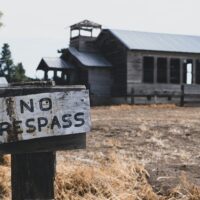When Can You Sue a Property Owner in California?

If you have been injured on someone else’s property in Oakland, you might be wondering if you can pursue legal action against them. When can you legally sue someone for property owner negligence in California? Who is liable for your injuries? Who can you sue, and when might you be unable to receive a settlement? These are all important questions, and they are probably best left answered by a qualified, experienced personal injury attorney in Oakland. That said, it never hurts to do a little bit of internet research on your own to get a better understanding of the various laws at play in California.
Of course, the most prudent course of action is to consult with a dependable, skilled attorney as soon as possible. These experts can explain the various laws and factors in a clear, concise manner. Not only that, but they can also guide you in the right direction and let you know whether you can realistically pursue legal action against any at-fault parties. Finally, a personal injury attorney in Oakland can represent you as you seek compensation for your damages, and they can significantly raise the chances of you receiving a fair, adequate settlement amount.
If possible, you should do your best to team up with a personal injury attorney who specializes in premise liability lawsuits. These experts understand the applicable laws better than anyone else, and they can assess your situation in an accurate and productive manner. If you are looking for a law firm in California with decades of experience with premise liability lawsuits, consider Mary Alexander & Associates.
A Stunning Example of Property Owner Negligence in California
In 2021, the New York Post reported on a stunning and despicable example of property owner negligence in California. Two military officers and their families were faced with terrible living conditions when they rented homes that had been poorly maintained by their landlords. Sewage backed up in bathtubs, and the smell permeated the plaintiffs’ clothing as a result. In addition, mold caused significant health concerns for both families. To make matters even worse, the landlord continued to charge the families rent even after they had moved out to escape the mold.
In the end, they were forced to file a lawsuit against the negligent property owners. These property owners were a number of LLCs that were in charge of operating and maintaining homes (some temporary) for Army, Navy, and Marine Corps service members. This is hardly the first instance of military families suing similarly negligent property owners; this story has sadly become quite common. The property owners were charged with fraud, deceptive practices, breach of contract, negligence, and other crimes.
Can I Sue?
The first thing you might be asking is whether or not you can actually sue the person who was responsible for your injuries. The simple answer is that if you believe that a property owner caused your injuries, you should explore the possibility of legal action against them.
The more complicated answer is that your success depends on your unique circumstances. The above example of military families suing their landlords highlights the importance of one specific factor in these types of lawsuits. The families alleged that their landlords knew about the hazards on their properties, and yet they still did nothing about it.
This is a key ingredient in a successful premise liability lawsuit, and it applies to virtually any other example of negligence. Another example might be a slip and fall in a grocery store. You might have slipped on a spilled jug of milk. In order to successfully receive compensation for your injury, you would need to prove that the grocery store staff were aware of the hazard, and yet they did nothing to address the issue.
This can get somewhat complicated, as property owners inevitably argue that they were planning to do something about the hazard, but they just did not have enough time. This then becomes a question of how much time should a “reasonable person” take to fix a hazard on their property. In the context of a spill in a grocery store, you might argue that it should take about five minutes to gather up the supplies, head over to the scene of the spill, and start cleaning it up.
In addition, property owners might argue that they did not owe you a duty of care because you were trespassing on their property. However, the same basic principle applies. If a property owner is aware that someone is trespassing on their land and does nothing to address the issue (such as calling the police), then it is assumed that they are okay with that person being on their land. As such, they now owe these trespassers a duty of care.
Reach Out Today
If you are ready to take your first step towards justice and compensation for your damages, we are ready to assist you. The statute of limitations means that the clock is ticking. If you wait too long, you will miss out on the compensation you deserve. Reach out to Mary Alexander & Associates at your earliest convenience and book a consultation. We will listen carefully to your situation and develop an action plan that fits.
